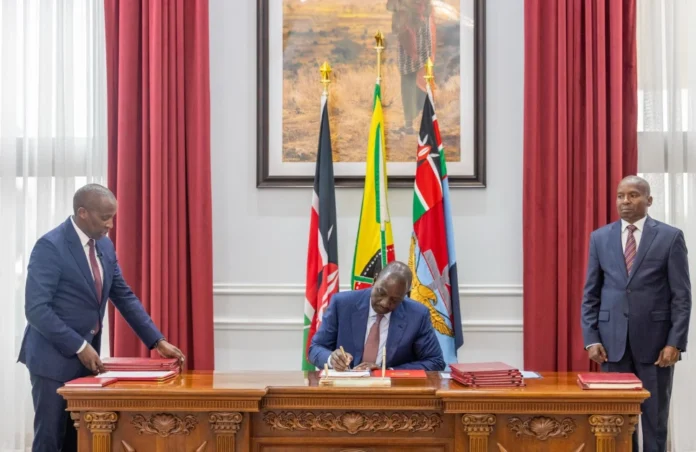The Kenyan government has taken a significant step in the fight against corruption and in strengthening social safety nets following President William Ruto’s assent to the Conflict of Interest Bill, 2023, and the Social Protection Bill, 2025. The signing ceremony took place on Wednesday at State House, Nairobi.
President Ruto hailed the new legislation as a pivotal development in Kenya’s governance framework, asserting that the enactment of the Conflict of Interest Bill would curb abuse of office and ensure that public resources are used strictly for their intended purpose. He said the law sets clear ethical standards for public officers, promoting integrity, transparency, and accountability across the public sector.
“This is a very consequential moment in Kenya. We are making it much more difficult for people to take advantage of the offices they occupy,” the President said. He further emphasized that the law not only holds public officers accountable but also empowers citizens to demand responsibility from those in leadership.
The new law repeals the Public Officer Ethics Act and consolidates all conflict of interest provisions into a single legal framework. It grants the Ethics and Anti-Corruption Commission (EACC) sweeping powers to implement and oversee compliance in all arms of government, including the Executive, the Legislature, and the Judiciary.
President Ruto underscored the enhanced role of the EACC, stating, “To the EACC, you now have levers to make sure that you protect the resources of the Republic of Kenya and hold every officer to account.”
The Conflict of Interest Act prohibits public officers from offering or accepting preferential treatment, being influenced by external employment offers, or engaging in business arrangements that compromise their duties. It also restricts them from holding interests in companies that do business with their institutions and bans outside employment that may conflict with official responsibilities.
Public officers will now be required to declare their income, assets, and liabilities, including those of their spouses and dependent children, and must recuse themselves from any decision where they have a personal interest.
Initially, President Ruto had returned the Bill to Parliament in April 2025 with reservations. After considering his recommendations, the National Assembly and the Senate passed the amended Bill on June 3 and July 23, respectively.
In addition to the anti-corruption legislation, the President also signed into law the Social Protection Bill, 2025. He said the new law represents the government’s deepened commitment to supporting vulnerable Kenyans through a comprehensive and inclusive safety net.
According to the President, the law will ensure that only truly vulnerable citizens benefit from government support, including access to medication, food, psychosocial care, and assistive devices. The bill establishes a unified, rights-based framework for delivering non-contributory social protection throughout the life cycle, from childhood to old age.
It introduces a National Board for Social Protection, to be chaired by a presidential appointee and composed of representatives from national and county governments as well as civil society. The board will oversee the design, coordination, and monitoring of all national social protection programmes.
County governments are now mandated to implement national social protection policies at the local level. They are required to enact localized strategies, allocate adequate resources, maintain updated registries of vulnerable populations, and coordinate interventions in partnership with the national government.
Those eligible for support under the new framework include orphans and vulnerable children, older persons living in poverty, persons with disabilities, those affected by disasters, and unpaid caregivers. The Cabinet Secretary for Social Protection is also empowered to expand the list based on emerging needs.
Applications for assistance will be subject to a registration and assessment process led by the board. Denied applicants will have the right to seek a review and appeal to the Cabinet Secretary or the High Court within 30 days.
A Social Protection Fund, to be managed by the National Treasury, will finance the initiatives under the new law. The President commended Labour and Social Protection Cabinet Secretary Dr. Alfred Mutua for his role in advancing the legislation, stating, “Congratulations to the minister responsible for social protection. You now have a robust framework to undertake the responsibilities assigned to your ministry.”
Among those present at the signing ceremony were National Assembly Speaker Moses Wetang’ula, Senate Speaker Amason Kingi, Attorney-General Dorcas Oduor, and other senior government officials.
With the enactment of these two transformative laws, Kenya moves forward in entrenching ethical leadership and ensuring that the nation’s most vulnerable are protected through a fair and sustainable social protection system.
Written By Rodney Mbua



















